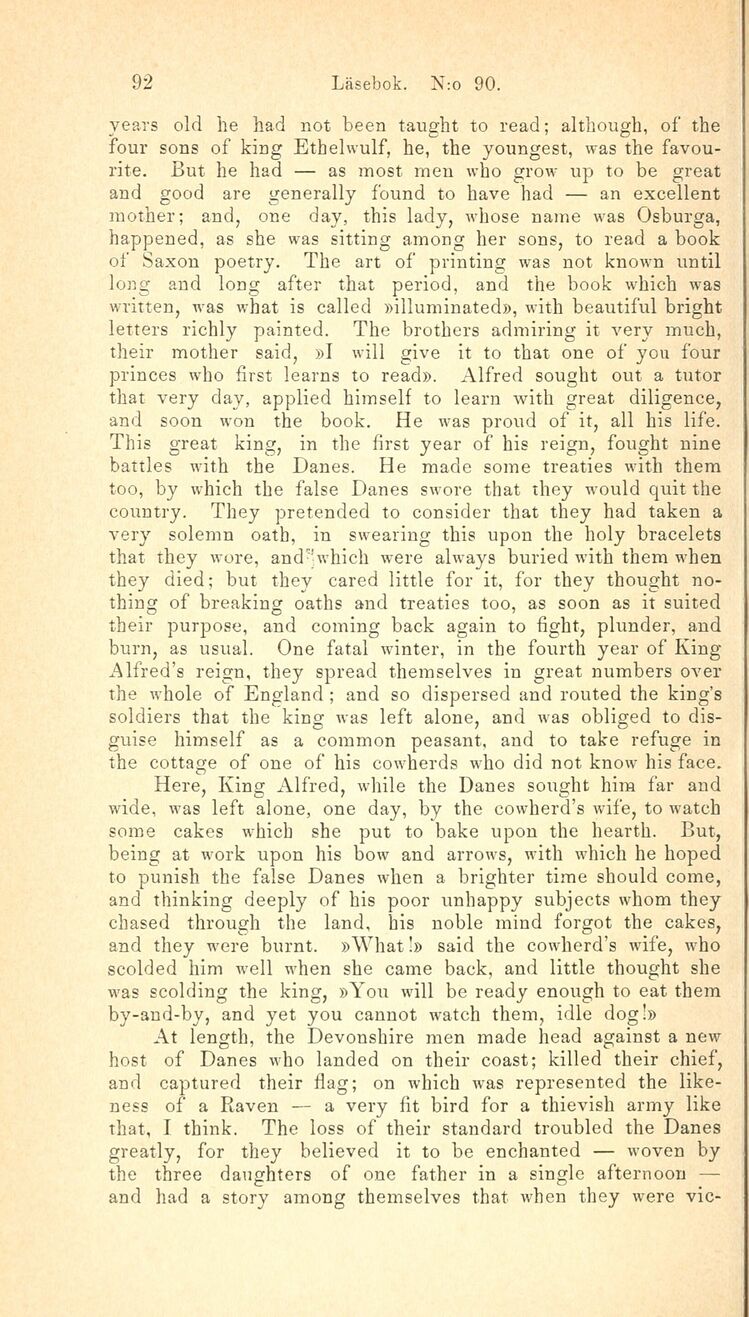
Full resolution (JPEG) - On this page / på denna sida - Läseboken - Stories of the Earlier History of England - 90. Alfred the Great

<< prev. page << föreg. sida << >> nästa sida >> next page >>
Below is the raw OCR text
from the above scanned image.
Do you see an error? Proofread the page now!
Här nedan syns maskintolkade texten från faksimilbilden ovan.
Ser du något fel? Korrekturläs sidan nu!
This page has never been proofread. / Denna sida har aldrig korrekturlästs.
92
Läsebok. iS:o 94.
years old he had not been taught to read; although, of the
four sons of king Ethelwulf, he, the youngest, was the
favourite. But he had — as most men who grow up to be great
and good are generally found to have had — an excellent
mother; and, one day, this lady, whose name was Osburga,
happened, as she was sitting among her sons, to read a book
of Saxon poetry. The art of printing was not known until
long and long after that period, and the book which was
written, was what is called »illuminated», with beautiful bright
letters richly painted. The brothers admiring it verv much,
their mother said, »I will give it to that one of you four
princes who first learns to read». Alfred sought out a tutor
that very day, applied himself to learn with great diligence,
and soon won the book. He was proud of it, all his life.
This great king, in the first year of his reign, fought nine
battles with the Danes. He made some treaties with them
too, by which the false Danes swore that they would quit the
country. They pretended to consider that they had taken a
very solemn oath, in swearing this upon the holy bracelets
that they wore, and’which were always buried with them when
they died; but they cared little for it, for they thought
nothing of breaking oaths and treaties too, as soon as it suited
their purpose, and coming back again to fight, plunder, and
burn, as usual. One fatal winter, in the fourth year of King
Alfred’s reign, they spread themselves in great numbers over
the whole of England ; and so dispersed and routed the king’s
soldiers that the king was left alone, and was obliged to
disguise himself as a common peasant, and to take refuge in
the cottage of one of his cowherds who did not know his face.
Here, King Alfred, while the Danes sought him far and
wide, was left alone, one day, by the cowherd’s wife, to watch
some cakes which she put to bake upon the hearth. But,
being at work upon his bow and arrows, with which he hoped
to punish the false Danes when a brighter time should come,
and thinking deeply of his poor unhappy subjects whom they
chased through the land, bis noble mind forgot the cakes,
and they were burnt. »What!» said the cowherd’s wife, who
scolded him well when she came back, and little thought she
was scolding the king, »You will be ready enough to eat them
by-and-by, and yet you cannot watch them, idle dog!»
At length, the Devonshire men made head against a new
host of Danes who landed on their coast; killed their chief,
and captured their flag; on which was represented the
likeness of a Raven — a very fit bird for a thievish army like
that, I think. The loss of their standard troubled the Danes
greatly, for they believed it to be enchanted — woven by
the three daughters of one father in a single afternoon —
and had a story among themselves that when they were vie-
<< prev. page << föreg. sida << >> nästa sida >> next page >>